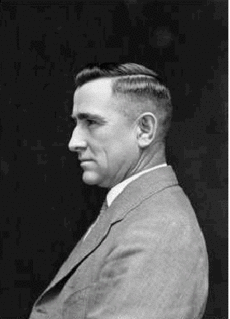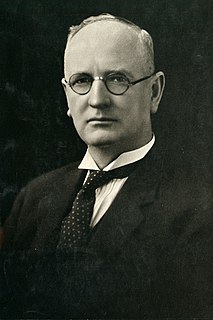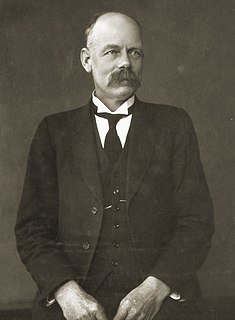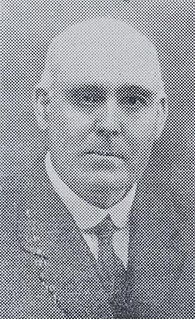Related Research Articles

The Nationalist Party was an Australian political party. It was formed on 17 February 1917 from a merger between the Commonwealth Liberal Party and the National Labor Party, the latter formed by Prime Minister Billy Hughes and his supporters after the 1916 Labor Party split over World War I conscription. The Nationalist Party was in government until electoral defeat in 1929. From that time it was the main opposition to the Labor Party until it merged with pro-Joseph Lyons Labor defectors to form the United Australia Party (UAP) in 1931. The party was a direct ancestor of the Liberal Party of Australia, the main centre-right party in Australia.

The Legislative Council, or upper house, is one of the two chambers of the Parliament of South Australia. Its central purpose is to act as a house of review for legislation passed through the lower house, the House of Assembly. It sits in Parliament House in the state capital, Adelaide.
This is a list of members of the Western Australian Legislative Council between 22 May 2001 and 21 May 2005:

John Cain was an Australian politician, who became the 34th premier of Victoria, and was the first Labor Party leader to win a majority in the Victorian Legislative Assembly. He is the only premier of Victoria to date whose son has also served as premier.

Lang Labor was a faction of the Australian Labor Party (ALP) consisting of the supporters of Jack Lang, who served two terms as Premier of New South Wales and was the party's state leader from 1923 to 1939.

Robert Stanley "Bob" Richards, generally referred to as "R. S. Richards" was the 32nd Premier of South Australia, representing the South Australian Branch of the Australian Labor Party.
This is a list of members of the South Australian House of Assembly from 1930 to 1933, as elected at the 1930 state election:
This is a list of members of the Western Australian Legislative Council from 22 May 1916 to 21 May 1918. The chamber had 30 seats made up of ten provinces each electing three members, on a system of rotation whereby one-third of the members would retire at each biennial election.
This is a list of members of the Western Australian Legislative Council from 22 May 1946 to 21 May 1948. The chamber had 30 seats made up of ten provinces each electing three members, on a system of rotation whereby one-third of the members would retire at each biennial election.
This is a list of members of the Australian Senate from 1929 to 1932. Half of its members were elected at the 14 November 1925 election and had terms starting on 1 July 1926 and finishing on 30 June 1932; the other half were elected at the 17 November 1928 election and had terms starting on 1 July 1929 and finishing on 30 June 1935. The process for filling casual vacancies was complex. While senators were elected for a six-year term, people appointed to a casual vacancy only held office until the earlier of the next election for the House of Representatives or the Senate.

State elections were held in South Australia on 8 April 1933. All 46 seats in the South Australian House of Assembly were up for election. The incumbent Parliamentary Labor Party government led by Premier Robert Richards was defeated by the opposition Liberal and Country League led by Leader of the Opposition Richard L. Butler. Each district elected multiple members.
This is a list of members of the Victorian Legislative Assembly from 1929 to 1932, as elected at the 1929 state election.
A referendum concerning the abolition of the New South Wales Legislative Council was put to New South Wales voters on 29 April 1961. The abolition was specifically rejected by voters. The text of the question was:
Do you approve of the Bill entitled "A Bill for an Act to Abolish the Legislative Council to provide that another Legislative Council shall not be created, constituted or established nor shall any Chamber, Assembly or House, other than the Legislative Assembly, designed to form part of the Legislative Parliament of New South Wales, be created, constituted or established until a bill for the purpose has been approved by the electors in a referendum to amend the Constitution Act, 1902 and certain other Acts; and for purposes connected therewith."

Stanley R. Whitford was a unionist and Labor politician in the State of South Australia.

James Jelley was an Australian politician and trade unionist. He was a Labor member of the South Australian Legislative Council from 1912 to 1933, representing Central District (1912-1915) and Central District No. 1 (1915-1933).
This is a list of members of the South Australian Legislative Council from 1915 to 1918.

Thomas "Tom" Gluyas was a politician in the State of South Australia.
This is a list of members of the South Australian Legislative Council from 1933 to 1938
The Parliamentary Labor Party was a political party active in South Australia from August 1931 until June 1934.
The Australian Labor Party , commonly known as Victorian Labor, is the semi-autonomous Victorian branch of the Australian Labor Party (ALP). The Victorian branch comprises two major wings: the parliamentary wing and the organisational wing. The parliamentary wing comprising all elected party members in the Legislative Assembly and Legislative Council, which when they meet collectively constitute the party caucus. The parliamentary leader is elected from and by the caucus, and party factions have a strong influence in the election of the leader. The leader's position is dependent on the continuing support of the caucus and the leader may be deposed by failing to win a vote of confidence of parliamentary members. By convention, the premier sits in the Legislative Assembly, and is the leader of the party controlling a majority in that house. The party leader also typically is a member of the Assembly, though this is not a strict party constitutional requirement.
